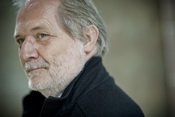Composer, conductor and music teacher Péter Eötvös was born in the Transylvanian city of Székelyudvarhely (Odorheiu Secuiesc) in 1944. After earning degrees in music composition and conducting from the Ferenc Liszt Academy of Music in Budapest and Cologne's Hochschule für Musik und Tanz, he began his career as the music director of the Comedy Theatre of Budapest before going to work with Karlheinz Stockhausen and Pierre Boulez. A member of Cologne's Stockhausen Ensemble between 1968 and 1976, he also worked at Westdeutscher Rundfunk's Studio for Electronic Music from 1971 until 1979. At the invitation of Pierre Boulez, he conducted the Ensemble intercontemporain at the opening of the Institut de Recherche et Coordination Acoustique/Musique (IRCAM) in Paris in 1978, and remained the ensemble's artistic director until 1991. Principal guest conductor with the BBC Symphony Orchestra between 1985 and 1988, he also served in the same role for the Budapest Festival Orchestra from 1992 until 1995. He has also served as the chief conductor of the Netherlands Radio Chamber Orchestra (1994-2004) and as principal guest conductor of the Hungarian National Philharmonic Orchestra (1998-2001), the Stuttgart Radio Symphony Orchestra (2003-2005), the Gothenburg Symphony Orchestra (2003-2007) and the Vienna Radio Philharmonic Orchestra (2009-2012). He often takes the podium to direct Europe's finest orchestras, including the Berlin, Munich, London and Vienna philharmonics and the Royal Concertgebouw Orchestra, as well as of the Los Angeles Philharmonic, in addition to regularly conducting leading radio orchestras. He has also been invited to guest conduct at the most renowned opera houses (including at La Scala, the Royal Opera House Covent Garden, La Monnaie, the Glyndebourne Festival Opera and Théâtre du Châtelet), where he has collaborated with such directors as Luca Ronconi, Robert Altman, Klaus Michael Grüber and Robert Wilson. He has established two foundations in Hungary, with the International Eötvös Institute Foundation he founded in 1991 being joined by the Péter Eötvös Contemporary Music Foundation in 2004, both of which provide support for young composers and conductors in the form of scholarships and advanced training courses as they start their careers. He spent two stints, from 1992 to 1998, and again between 2002 and 2007, as a professor at Karlsruhe's Hochschule für Musik, with the intervening time from 1998 to 2001 occupied teaching at his alma mater in Cologne. He holds master classes around the world (for example, in Edenkoben, Lucerne, Basel, Luxembourg and Madrid), and also frequently teaches at the Bartók Seminar in Szombathely. He is a well-known and recognised composer who receives commissions for new works from Europe's top orchestras and opera houses. His symphonic works (Atlantis, zeroPoints, Shadows, Jet Streams, Levitation, CAP-KO, SEVEN, Cello Concerto Grosso) and his operas (Three Sisters, Le Balcon, Angels in America, Love and Other Demons, Die Tragödie des Teufels) are performed all over the world. He is the recipients of many awards and honours, having won Hungary's Bartók-Pásztory Award (1997), the Gundel Award (2001), the Hungarian Classical Award (2001), the Kossuth Prize (2002), the Béla Bartók Commemorative Award (2006) as well as being named a Hungarian Cultural Ambassador (2008), decorated with the Order of Saint Stephen (2015) and the Kossuth Grandprize (2024). His international recognitions include the Prix Claude Rostand (1997/1998, for his opera Three Sisters), Officier de l'ordre des l'arts et des lettres (1988), the Royal Philharmonic Society's music award (2002), Commandeur de l'Ordre des l'Arts et des Lettres (2003), the Pro Europa Composition Prize (2004), the Cannes Classical Award for a Living Composer (2004) and the Leone d'Oro for Lifetime Achievement (2011). Péter Eötvös is a member of the Berlin Akademie der Künste, Budapest's Széchenyi Academy of Literature and Arts, the Dresden Academy of Fine Arts and the Royal Swedish Academy of Arts.
